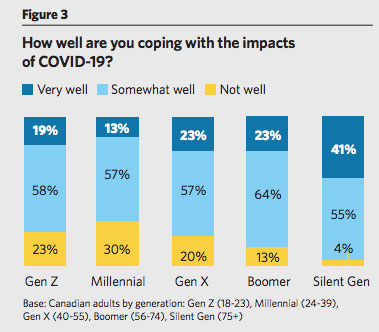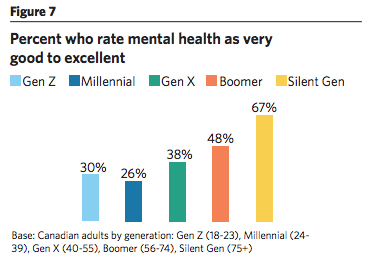Study Suggests That Older Generations Are Handling COVID-19 Impact Better Than Millennials or Gen-Z

Surprising findings from a recent Four Pillars survey indicate older generations, especially those over 50, are handling the pandemic better than their younger counterparts. Photo: Cem Tekkeinolu/NurPhoto/Getty Images
A new study suggests that the older generations are surviving the COVID-19 health scare and economic crisis better than younger age groups. On top of that, it reveals a burgeoning new attitude toward the definition of retirement.
The Four Pillars of the New Retirement, a huge study conducted by brokerage firm Edward Jones in partnership with Age Wave and Harris polls, surveyed more than 9,000 adults in the U.S. and Canada. The poll asked the different generations to answer questions about their finances, health and attitudes, especially in light of the pandemic. The age groups surveyed were:
- Gen-Z (ages 18-23)
- Millennials (ages 24-39)
- Gen-X (ages 40-55)
- Boomers (ages 56-74)
- Silent Generation (ages 75-plus)
Coping With Crisis

One of the surprising findings from Four Pillars survey is that the older generations, especially those over 50, report that they are surviving these tumultuous times better than the younger generations.
When asked, “How well are you coping with the impacts of COVID-19?” 33 per cent of boomers and 39% of the Silent Gen responded “Very Well.” Amazingly, only 12 per cent of boomers and 0 per cent of the Silent Gen answered “Not Well.”
Compare these results to those of the younger generations and you get a revealing takeaway: only 21 per cent of Gen-Z and 26 per cent of millennials said they were coping “very well” while 24 per cent of each age group answered “Not Well.”

The survey also asked participants to rate their mental health: 48% of Boomers and 67% of the Silent Gen said their mental health was “excellent.” But only 30% of Gen Z and 26% of Millennials rated their mental health as excellent.
These results may seem surprising, especially when you consider that the older generations are the ones at the greatest health risk if they contract COVID-19. Of the nearly 12,000 people who have died due to the coronavirus, 89% have occurred in the 70-plus age group.
Perspective and Experience
David Cravit, Chief Marketing Officer at CARP and a demographic analyst, thinks that the ability of older generations to cope in the face of a raging pandemic might be due to several factors, including experience, perspective and an ability to avoid being overwhelmed by the “noise” on social media.
“Most older people are in a much better financial situation than younger groups, and are less anxious about financial crisis as a result. Either they are established in a solid or well paying career or, if they’re retired, their living expenses are covered by savings or a pension. Plus, many of the older generations have paid off their mortgages, so they have a supply of equity to fall back on that younger groups don’t have.”
Another factor he mentions is that with age comes perspective.
“People from older generations have been around a lot longer and, with experience, they have learned to take big crises in stride,” says Cravit. He points to the fact that those over 60 are from an era when disease outbreaks like measles, mumps or polio were a fact of everyday life.
So when something like COVID-19 comes around, “while the older generations recognize the danger it poses, it doesn’t phase them as much as it would the younger cohort who have little or no familiarity with general health threats.”
This “been there, done that” element — whether it’s surviving past health scares or rolling with economic crises — allows the older crowd to weather the storm with equanimity and maintain their mental health throughout the pandemic.
Cravit also points to the noise of social media as a third reason why the younger generations might be more spooked by the health crisis than their parents or grandparents. Younger generations, he feels, spend so much time on social media platforms that they have trouble keeping up with the misinformation, scaremongering and rapid and ever-changing messages. “If you’re constantly riding the rollercoaster of social media, it’s bound to have a negative affect on your anxiety levels,” he says.
The New Retirement
The Four Pillars study also takes a deep look at the changing attitudes North Americans have toward retirement.
“While retirement was transforming in many ways long before COVID-19 entered our lives, this pandemic has accelerated some key retirement trends,” writes David Gunn, head of Edward Jones Canada. “This landmark study reveals that, more than ever before, retirement is far more than a destination than an end point.”
The research concludes that retirement attitudes are changing. It’s no longer only about an abrupt end to your career and living off your savings. Instead, it’s about maintaining your health, nourishing family relationships, seeking a sense of purpose and getting the most out of your savings. “Once viewed as a time to wind down, retirement is increasingly a time of new choices, new freedoms, new purpose and new challenges,” says the report.
“This is basically the Zoomer manifesto come to life,” contends Cravit, who has authored two books that track society’s changing attitudes towards age and retirement.
Retirement today, he agrees, is no longer considered the end of one’s engagement with society. Instead, it’s more about taking control of a new and exciting stage in life.
“Today, people have big aspirations of what they think retirement should look like,” says Cravit. “Whether it’s keeping fit, returning to the workforce, volunteering, travelling or spending time with the family, the new retirement is about choosing what you want and then figuring out how to make that happen.”
The findings in the Four Pillars report back up this contention. When asked to choose a definition of the new retirement, 55% chose “a new chapter in life.” This was far and away the leading choice, beating out other definitions such as “a time for rest and relaxation” (22%); “a continuation of what life was” (15%) or the “beginning of the end” (8%).
Cravit suggests that this new take on retirement is a very “boomerish” way of thinking.
“Boomers have always lived by the mantra: ‘I’m not just a passenger. I’m a doer,’” he says. They are re-inventing this stage in life to suit this philosophy.
The study found that Boomers are rejecting the “rather low-key retirements” that their parents lived in favour of one that is more “active, engaged, exploratory and purposeful.”
RELATED:
What’s Fuelling Anti-Mask Rage and Why Are Older Generations Getting Blamed For It?
COVID-19 Sparks Ugly Social Media Backlash Against Older Generations